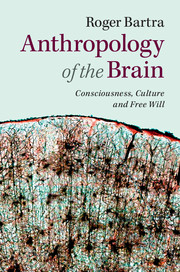Book contents
- Frontmatter
- Contents
- Preface
- Part I Consciousness and symbolic systems
- 1 The hypothesis
- 2 Evolution of the brain
- 3 Brain plasticity
- 4 Is there an internal language?
- 5 Amputations and supputations
- 6 The atrophied exocerebrum
- 7 The symbolic substitution system
- 8 Neuronal mirrors
- 9 Consciousness within hand’s reach
- 10 Outside and inside: the immense blue
- 11 The musical spheres of consciousness
- 12 Artificial memory
- 13 The lost soul
- Part II Brain and free will
- Bibliography
- Index
- References
9 - Consciousness within hand’s reach
Published online by Cambridge University Press: 05 June 2014
- Frontmatter
- Contents
- Preface
- Part I Consciousness and symbolic systems
- 1 The hypothesis
- 2 Evolution of the brain
- 3 Brain plasticity
- 4 Is there an internal language?
- 5 Amputations and supputations
- 6 The atrophied exocerebrum
- 7 The symbolic substitution system
- 8 Neuronal mirrors
- 9 Consciousness within hand’s reach
- 10 Outside and inside: the immense blue
- 11 The musical spheres of consciousness
- 12 Artificial memory
- 13 The lost soul
- Part II Brain and free will
- Bibliography
- Index
- References
Summary
It has been thought that if we strip the brain of subjective devices and cultural supplements, consciousness could be, so to say, at our fingertips. Consciousness would be inside our brain, nestled in brain networks, waiting to be able to express itself. There was a spectacular case in the nineteenth century of a person whose two essential channels of communication with the world were cut off for the first seven years of her life. Helen Keller, born in 1880 in Alabama, became totally blind and deaf at nineteen months of age. At the age of seven she began a tutoring process that seems miraculous and that led her to an extraordinary mastery of the language and culture of her time. In a tender and intelligent book, she describes what she calls “the world I live in.” The great psychologist William James, after reading the book, wrote to Helen Keller that he was “quite disconcerted, professionally speaking, by your account of yourself before your ‘consciousness’ was awakened by instruction,” and that he could not understand how she lacked an emotional memory of the period of her life before she began to use the manual alphabet system. Keller herself had written that before the arrival of Anne Sullivan, the teacher who taught her to communicate, she lived “in a world that was a no-world” and she did not think she would ever be able to adequately describe “that unconscious, yet conscious time of nothingness.” It seemed that this brilliant woman almost had the memory of her childhood within her reach, the time when she was all but totally devoid of cultural tools that could mark consciousness “in a natural state” with artificial imprints. In a previous book, her fascinating autobiography, Keller points out that, before learning language, she somehow knew that she was different from others. While she used scarcely a dozen rudimentary signs for expressing her wishes, everyone else moved their lips. She states that during this time “the desire to express myself grew.”
- Type
- Chapter
- Information
- Anthropology of the BrainConsciousness, Culture, and Free Will, pp. 60 - 70Publisher: Cambridge University PressPrint publication year: 2014



